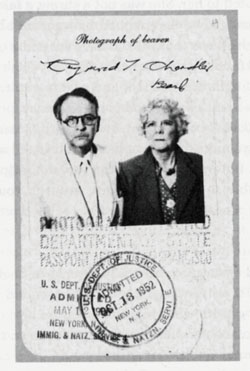 Only one recording of Raymond Chandler’s speaking voice survives, a BBC interview conducted with Chandler in 1958 by none other than Ian Fleming. You can listen to it by going here. If you do so, you’ll be staggered to learn that the creator of Philip Marlowe sounds…well, wimpy.
Only one recording of Raymond Chandler’s speaking voice survives, a BBC interview conducted with Chandler in 1958 by none other than Ian Fleming. You can listen to it by going here. If you do so, you’ll be staggered to learn that the creator of Philip Marlowe sounds…well, wimpy.
I mention this fact because I’ve long been fascinated by recordings of the voices of famous writers and other artists, many of which I find to be personally revealing in ways that no other documentary evidence can equal. The BBC has a vast archive of recordings as rare and illuminating as the Chandler interview, but until recently it sat firmly on them. Now the British Library Sound Archive has started releasing a series of spoken-word CDs drawn from the BBC archives, the first five volumes of which are devoted to W.H. Auden, Graham Greene, George Bernard Shaw, Evelyn Waugh, and H.G. Wells.
Yep, you guessed it: I’ve written a “Sightings” column for tomorrow’s Wall Street Journal about the great spoken-word recordings of the twentieth century, only a handful of which have made it to CD. I suspect you’ll find the column frustrating, since I devote most of it to telling you about amazing things that you can’t hear unless you go to a very well-stocked record library, but I think it’ll interest you anyway.
If you’re curious, pick up a copy of Saturday’s Journal and see what I have to say.
UPDATE: Read the whole thing here.
TT: Almanac
“Each man is questioned by life; and he can only answer to life by answering for his own life; to life he can only respond by being responsible.”
Viktor E. Frankl, Man’s Search for Meaning
TT: So you want to see a show?
Here’s my list of recommended Broadway, off-Broadway, and out-of-town shows, updated weekly. In all cases, I gave these shows favorable reviews (if sometimes qualifiedly so) in The Wall Street Journal when they opened. For more information, click on the title.
Warning: Broadway shows marked with an asterisk were sold out, or nearly so, last week.
BROADWAY:
• Alfred Hitchcock’s The 39 Steps * (comedy, G, suitable for bright children, reviewed here)
• August: Osage County * (drama, R, adult subject matter, reviewed here)
• Avenue Q * (musical, R, adult subject matter and one show-stopping scene of puppet-on-puppet sex, reviewed here)
• Boeing-Boeing (comedy, PG-13, cartoonishly sexy, reviewed here)
• Gypsy (musical, PG-13, adult subject matter, reviewed here)
• The Little Mermaid * (musical, G, entirely suitable for children, reviewed here)
• South Pacific * (musical, G/PG-13, some sexual content, brilliantly staged but unsuitable for viewers acutely allergic to preachiness, reviewed here)
OFF BROADWAY:
• The Fantasticks (musical, G, suitable for children capable of enjoying a love story, reviewed here)
IN LENOX, MASS:
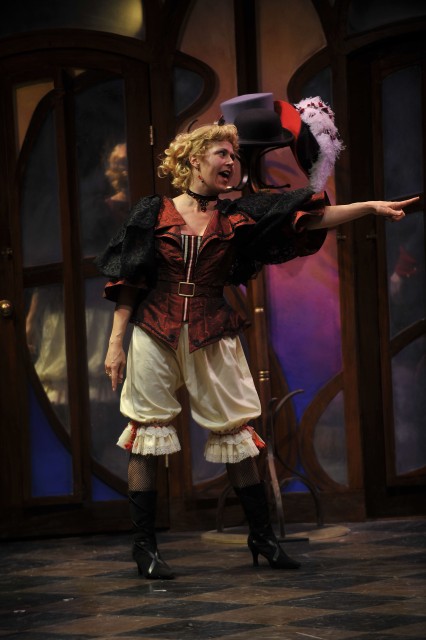 • Othello/All’s Well That Ends Well/The Ladies Man (Shakespeare/Feydeau, PG-13, not suitable for children, playing in festival repertory through Aug. 31, reviewed here)
• Othello/All’s Well That Ends Well/The Ladies Man (Shakespeare/Feydeau, PG-13, not suitable for children, playing in festival repertory through Aug. 31, reviewed here)
IN GARRISON, N.Y.:
• Cymbeline/Twelfth Night (Shakespeare, PG-13, playing in festival repertory through Aug. 31, reviewed here)
CLOSING SOON ON BROADWAY:
• A Chorus Line * (musical, PG-13/R, adult subject matter, closes Aug. 17, reviewed here)
TT: Almanac
“I don’t think God punishes people for specific things. I think he punishes people in general, for no reason.”
Christopher Durang, The Marriage of Bette and Boo
CAAF: 5 x 5 Books For The Swim-Obsessed by Jenny Davidson
5 x 5 Books … is a recommendation of five books that appears regularly in this space. Today’s installment comes from Jenny Davidson, author of the marvelous new young-adult novel The Explosionist and proprietrix of Light Reading.
In 2007 I fell head over heels in love — with swimming. This led me to spend as much time as I could in the water, but unfortunately one cannot always be swimming. the insatiable desire for ‘swim lit.’ It was difficult to narrow my choices down to five — what about Diana Nyad’s Other Shores, Charles Sprawson’s Haunts of the Black Masseur: The Swimmer as Hero and Sherman Chavoor’s The Fifty-Meter Jungle: How Olympic Swimmers are Made? What about the complete novels of Chris Crutcher?!? But here’s my list, and I hope you will take a dip or two yourself this summer under their watery influence.
1. Waterlog by Roger Deakin. An altogether magical book, rather in the spirit of W. G. Sebald, about ‘wild swimming’: the author breaststrokes his way around Britain’s less tame spaces and recounts his adventures in angelic prose. (See also.)
2. Swimming to Antarctica: Tales of a Long-Distance Swimmer by Lynne Cox. At age fifteen, Cox set a world record swimming the English Channel. Later she swam across the Bering Strait at a time when political strain made it very doubtful whether she would obtain permission to set foot on Russian soil. An inspiring book by an exceptional athlete whose ability to tolerate very low water temperatures made possible the feat alluded to in the book’s title.
3. The Science of Swimming by ‘Doc’ Counsilman. For the hard-core swim-obsessed only! Almost mystically redolent of mid-20th-century American sports science, Counsilman’s tome includes gems like the following: “The Utopian view of an existence without any form of stress, either physical or mental, is not conducive to the development of a person well prepared for existence in a competitive society.”
4. In Lane Three, Alex Archer by Tessa Duder. A wonderful young-adult novel with a strong autobiographical basis; like her protagonist Alex Archer, Tessa Duder was a talented New Zealand swimmer in the late 1950s with her eyes set on the highest goals in competitive swimming. Appealingly introduces the term ‘togs’ (for bathing suit) and made me grateful for the use of polyester and lycra rather than itchy sagging wool for the suits one wears in the pool nowadays.
5. Call Me By Your Name by André Aciman. Finally, this last selection is incidentally a great novel of swimming, cycling and running, and should be adopted by triathletes everywhere as their literary inspiration.
TT: Snapshot
Mary Martin sings “I’m Flying,” from the 1960 NBC telecast of Jerome Robbins’ musical version of J.M. Barrie’s Peter Pan:
(This is the latest in a weekly series of arts-related videos that appear in this space each Wednesday.)
TT: Almanac
“Never ascribe to an opponent motives meaner than your own.”
J.M. Barrie, rectorial address, St Andrew’s University, Scotland (May 3, 1922)
TT: Travels with Mrs. T (II)
Where else have I been lately? If you read my Wall Street Journal drama column, you’ll know that Mrs. T and I recently paid very happy visits to the Hudson Valley Shakespeare Festival in Garrison, New York, the Weston Playhouse in Weston, Vermont, and Shakespeare & Company in Lenox, Massachusetts. We started off, though, by spending two nights in the southwest Catskills purely for our pleasure, without a stage in sight.
 Since we were both under the weather when we honeymooned at Ecce Bed and Breakfast last October–weddings will do that to you–I decided to treat Mrs. T to a return visit before embarking on our theater-related travels. The picturesque Ecce, whose Web site accurately describes it as being “perched on a bluff 300 feet above the Upper Delaware River,” is the place we like best other than home, not least because Alan Rosenblatt goes out of his way to pamper his guests. I raved about Ecce in this space after staying there for the first time, and since then I’ve come back as often as possible. When I brought my wife-to-be to Ecce a year ago, we decided on the spot to spend part of our honeymoon there. Would that we’d been feeling better when the great day came, but we made up for it this time around.
Since we were both under the weather when we honeymooned at Ecce Bed and Breakfast last October–weddings will do that to you–I decided to treat Mrs. T to a return visit before embarking on our theater-related travels. The picturesque Ecce, whose Web site accurately describes it as being “perched on a bluff 300 feet above the Upper Delaware River,” is the place we like best other than home, not least because Alan Rosenblatt goes out of his way to pamper his guests. I raved about Ecce in this space after staying there for the first time, and since then I’ve come back as often as possible. When I brought my wife-to-be to Ecce a year ago, we decided on the spot to spend part of our honeymoon there. Would that we’d been feeling better when the great day came, but we made up for it this time around.
When you visit Ecce, by the way, be sure to have dinner up the road at Restaurant 15 Main in Narrowsburg, which is as good a place to eat as you’ll find anywhere on or near the East Coast.
From there we drove east, and I went back to work:
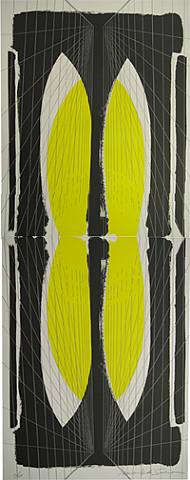 • In Garrison we slept across the Hudson River at Storm King Lodge, which has become our regular stopping place whenever I cover the Hudson Valley Shakespeare Festival, partly because it’s so cozy and partly because it’s a stone’s throw from the Storm King Art Center, where we saw a show of lithographs and drawings by Mark di Suvero, who is better known for his large-scale outdoor sculpture.
• In Garrison we slept across the Hudson River at Storm King Lodge, which has become our regular stopping place whenever I cover the Hudson Valley Shakespeare Festival, partly because it’s so cozy and partly because it’s a stone’s throw from the Storm King Art Center, where we saw a show of lithographs and drawings by Mark di Suvero, who is better known for his large-scale outdoor sculpture.
Mrs. T and I never fail to meet nice people at Storm King Lodge, the first of whom were Hal and Gay Janks, the innkeepers. Hal, who makes a mean omelet, used to play bass trombone with the Metropolitan Opera Orchestra and is a font of anecdotes about his years in the pit. This year we breakfasted with one of Hal’s best friends, a tuba player named Peter Sexauer whose father, amazingly enough, was a member of John Philip Sousa’s band. Peter loaned me a copy of Marching Along, Sousa’s long-out-of-print 1928 autobiography, which I found so delightful that I’m going to write a “Sightings” column about it next month.
As I mentioned in my Journal review, we also toured the Boscobel Restoration, on whose immaculately kept grounds Hudson Valley Shakespeare is headquartered:
The company performs in a huge tent pitched on the lawn of the Boscobel House, a lovingly restored Federal-style 1808 mansion located on a bluff overlooking the Hudson River….Come early enough in the day to take a tour of Boscobel and you can revel in “‘The Glorious Scenery Must Ever Excite’: Nineteenth-Century American Paintings of the Hudson Highlands,” the first show to be installed in the mansion’s new basement art gallery. Many of the 29 canvases and works on paper in this well-curated exhibition portray sites that are located within a 20-mile radius of the Boscobel Restoration.
Go.
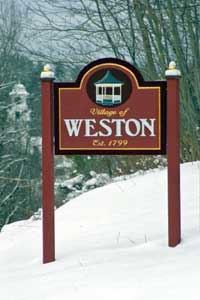 • Weston, which is nestled among the Green Mountains of Vermont, is small to the point of invisibility. Perhaps because it’s also slightly off the beaten path, Weston has steered clear of the self-conscious italicization that infects so many towns on the New England summer-festival circuit, some of which now resemble nothing so much as theme parks. Unlike them, Weston is what it is–and that’s what I like about it.
• Weston, which is nestled among the Green Mountains of Vermont, is small to the point of invisibility. Perhaps because it’s also slightly off the beaten path, Weston has steered clear of the self-conscious italicization that infects so many towns on the New England summer-festival circuit, some of which now resemble nothing so much as theme parks. Unlike them, Weston is what it is–and that’s what I like about it.
Mrs. T and I stayed at The Inn at Weston, which is charming, comfortable, and a short walk from the village green where the Weston Playhouse is located. We dined very well at the playhouse’s downstairs cafe, whose kitchen is run by Bob and Linda Aldrich, the owners of the inn. At breakfast the next morning we met a pediatric plastic surgeon and amateur musician named June Wu who lives in our New York neighborhood. As if that weren’t coincidence enough, June turned out to be a fan of Paul Moravec, my collaborator on The Letter. Small world, isn’t it?
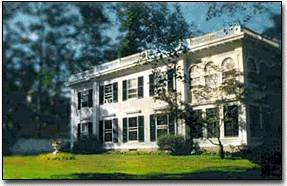 • After booking us into various inns in and near Lenox, Mrs. T finally found the perfect place to stay. It takes a minute and a half to drive from the front door of Gateways Inn to the parking lot of Shakespeare & Company, and Tanglewood isn’t much farther off. The rooms are unoppressively handsome, the restaurant first rate (and open late, too, making it possible to eat after a show, which can be hard to do in Lenox). The bar is stocked with some two hundred and fifty different single-malt Scotches–I counted six varieties of Glenfiddich alone–and Fabrizio and Rosemary Chiariello, the hosts, will do anything within reason to make you happy.
• After booking us into various inns in and near Lenox, Mrs. T finally found the perfect place to stay. It takes a minute and a half to drive from the front door of Gateways Inn to the parking lot of Shakespeare & Company, and Tanglewood isn’t much farther off. The rooms are unoppressively handsome, the restaurant first rate (and open late, too, making it possible to eat after a show, which can be hard to do in Lenox). The bar is stocked with some two hundred and fifty different single-malt Scotches–I counted six varieties of Glenfiddich alone–and Fabrizio and Rosemary Chiariello, the hosts, will do anything within reason to make you happy.
* * *
As for the present moment, I’m still in Santa Fe and busy as hell, and I expect to remain so until Friday, when I depart for Santa Cruz by way of Albuquerque, Phoenix, and San Francisco. (The city’s motto ought to be Santa Fe–you can’t get here from there!) So far I have two deadlines, two dinner appointments, three breakfast appointments, and four operas on my calendar.
Later, in other words.
(Second of two parts)
